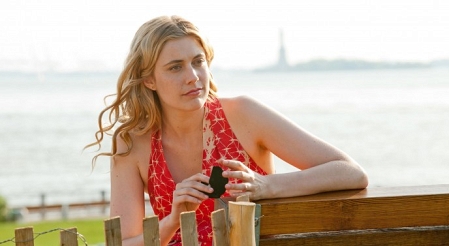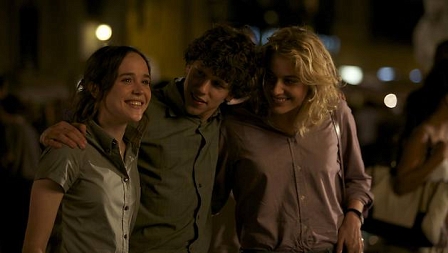Erstellt am: 13. 9. 2013 - 14:58 Uhr
Greta Gerwig
Greta Gerwig ist gerade 30 geworden und noch immer ein It-Girl. Kaum eine Akteurin wirkt derzeit im Arthouse-Kino so ungeschminkt glamourös wie GG. Diese Frau klingt wie ein Label. Ihre intensive Leinwand-Präsenz zeugt von sympathischem Understatement.

Fox Searchlight
Ihre leichtfüßige Natürlichkeit hat Greta Gerwig von den No-budget-Mumblecore-Produktionen eines Joe Swanberg bis hin zu etablierten unabhängigen Regiegrößen beeindruckend hinüber gerettet - wie etwa in Woody Allens "To Rome with Love".

Sony Pictures Classics
Ihre schrulligen Posen für hippe US-Magazin-Fotostrecken wirken genauso authentisch wie ihr tolpatschiger Part in ihrem aktuellen Film "Frances Ha".
In dieser Hommage an junge Neurotikerinnen und das moderne New York ist Frances in den Hipster-Zirkeln von Brooklyn eine unfreiwillig komische Ausnahmeerscheinung. Eine unsichere Tänzerin in privaten und beruflichen Nöten. Diese Rolle hat sich Gerwig gemeinsam mit ihrem Regisseur und Lebensgefährten Noah Baumbach auf den Leib geschrieben, der sich auch schon mal mit zarten Slapstick aus der Affäre zieht.
So eine romantische Heldin mit prekärem Lebensstil, die hat Greta Gerwig auch schon neben Ben Stiller in "Greenberg" gemimt.
Greta Gerwig zählt zum Freundeskreis von Lena Dunham, der Erfinderin der HBO-Fernsehserie "Girls". Auch Greta performt, schreibt und inszeniert schlagfertige junge Frauenfiguren, für die Sexiness und Selbstbewusstsein wie Fremdwörter klingen.
Greta Gerwig im Interview
FM4-Filmredakteurin Petra Erdmann hat Greta Gerwig zu einer Interviewsession in Paris getroffen.
Petra Erdmann: Hi Greta Gerwig. What a beautiful name - is that your real name?
Greta Gerwig: It is my real name. It sounds very German or Austrian. My family from a long time ago was from there and so I think my mom always wanted me to have a name that seems like it fits with my last name. She likes alliterations so the double-"G". 100 percent real.
So how would you describe your career as an actress coming from this, let's say, New York independent mumble core scene and just got to Woody Allen?
When I graduated from college I really knew that I wanted to be involved with film or theater. I love theater, too. I didn't know exactly how. But I was writing plays, I was acting, I was planning to go to graduate school, I was working on films, ... I was working a lot of day jobs and it feels like this happens a lot in my life for all -
The first two years out of college, to me on the one hand, were really lost - no, not lost but I mean I wasn't financially successfull. I was sleeping on an air mattress in a room that I shared with another girl and it was really very scary financially; I didn't have health insurance. I was always kinda living hand-to-mouth.
So it sounds a little bit like Frances in the film "Frances Ha"?
The difference between me and Frances was, I was in the New York Times when I was 23 which was crazy. There was an article written about these films, so in some ways I wasn't doing well, in other ways I was being recognized and I was going to film festivals. It was this odd double existence. At the end of it was really like, I looked up and people said: "Oh, you have a body of work!" - And I thought "Do I have...?" It didn't feel like it. To me, it felt like I was keeping my head down and, you know, things would encourage me to keep going, but I felt like I was under water the whole time in a submarine. To be totally honest I've had moments where I´m like "Oh, this is a good moment", but I still feel like I´m in a submarine and I haven´t come up for air yet, because I´m 29 now. I graduated when I was 22 and it feels like seven or eight years just full speed ahead. And oh my God, it´s almost like you´re bracing because it´s so scary. You´re trying to be an actress and a writer and a director. You´re trying to work as an artist and it´s almost like you´re just closing your eyes and going just working as hard as you can and hoping that cumulatively, it ends up as a career.
Where does this insecurity come from?
Probably I was born with it. I feel like I´ve always had to earn my place at the table. I mean I always wanted to be at the table - whatever that means - of actors and writers and artists and directors. People who inspire me. And I feel like it´s certainly not my birth right. I didn´t grow up in New York, I didn´t grow up around artists. So you know I feel very connected to how easily none of this could have happened and so I don´t know - you just never really lose that feeling.
In this movie, "Frances Ha", you´re playing this - let´s say insecure wannabe modern dancer. It´s kind of a hipster understatement. You´re in the end of your twenties, almost thirty and it´s this girlishness so don´t you feel like a woman already?
Oh, I do feel like a woman now. I made this film I guess when I was 28, 29. I mean it´s not that far away, but it does feel like it. In some ways, having made this film I almost felt like I grew up by having made it. I feel like I had to write it, I feel like I had to make it. And having made it I feel more like a woman and more like I´m grounded in myself and I know what I´m doing.
I certainly think authorship for me helps with that. There's still this expectation, the normal thing would be to be married and I think certainly in intellectual circles in New York there was more women in the workforce, women really breaking through glass ceilings and all of that. But where I grew up that wasn't true. You kind of get married by the time you were 25 or 26 and I think what's interesting now is that women have the ability to go through this kind of passages that were previously reserved for men, which is anxiety about career and anxiety about authorship and making your mark on the world and what does life have for you and ambition and how that squares with your talents. I think there's one way to look at it as arrested development and I think there's another way to look at it, which is like you're being given an opportunity to actually live life now, opposed to just step into roles of wife and mother.
You play the character of Frances in Noah Baumbachs film "Frances Ha". You're living together with boys and girls, you're sharing appartments, how do you live personally? Is this a concept you like?
At this point, I don't live in an apartment with people, I live alone. I really loved it, when I did it, so I was pretty well equiped to live the slightly broke artist lifestyle in New York. And I live alone now and there is a way in which it's lonely. You get something but you also lose something and I think in some ways I allowed myself to be swept up in other people's narratives and their days more, because I was living with them. Someone would say "Do you want to come with us?" and all of a sudden I'd be on someone else's journey and I always thought that was kind of fun. But at a certain point, I think you realise you can't endlessly step out of your own life and into other people's lifes. And I think a lot of it is usurping an actor, that you're always stepping into other people's lives and into other directors' visions and it's satisfying, because it's like a vacation from yourself. But you also feel kind of empty at some point because you feel like you have nothing that's yours. It feels like it's a collection of other people's ideas, which is why I think for me writing and eventually directing comes in.
Interview Podcast
Alle Gespräche in voller Länge, auch das von Greta Gerwig, im FM4 Interview Podcast
As an actress you're also directed, by filmmakers. So what would you do, what wouldn't you do?
Well, I've done a lot of nudity and I've done a lot of sex scenes. I would never have actual sex on screen. Other than that - when I started to make films and I would do nudity I wouln't even think about it, I would just do it, it wasn't a big deal. In a way I almost felt like I was taught to be ashamed of myself.


